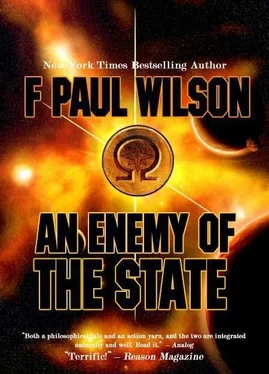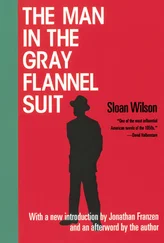The first one looked carefully around him. Satisfied that there was no one else on the roof, he nodded to the other and they removed two boxes from their craft, one large and rectangular, the other small and cubical. Carrying the larger box between them with the smaller resting atop it, they pushed through the door to the drop-chute and disappeared.
And that was that. Broohnin sat and bitterly questioned what in the name of the Core he was doing there alone on a roof watching two disguised Flinters unload a couple of boxes from their flitter. He knew no more now about their smuggling procedure than he did before. Bored and disgusted, he waited until he was sure the Flinters were safely behind the door to their apartment, then took the drop-chute directly to street level and headed for the nearest monorail stop.
THE WRACKING TOTAL-BODY PARASTHESIA that enveloped him during the lift into real space as his nervous system was assaulted from all sides was an almost welcome sensation. Vincen Stafford had made the first long jump in his probe ship. The nausea that usually attended entering and leaving subspace passed unnoticed, smothered by a wave of exultation. He was alive again. He was free. He was master of reality itself.
After a few moments of silent revelry, he shook himself and got to work, taking his readings, preparing the beacon to be released and activated. It would send out an oscillating subspace laser pulse in the direction of the radio sources in the Perseus arm; in real space it would send a measured radio beep. Stafford considered the latter mode useless since his subspace jumps would take him far ahead of the radio pulses, but if that was the way the people running the brand-new Imperial Bureau of Interstellar Exploration and Alien Contact wanted it, that's the way they would get it.
The subspace laser beacon was a good idea, however. If the target radio sources really did belong to another interstellar race, and that race was advanced enough to have developed subspace technology, the beacons he and his fellow probe pilots would be dropping off in a predictable zigzag pattern would blaze an unmistakable trail through the heavens for anyone with the equipment to follow. Hopefully, some member of that race would plot out the course of one of the probes and send a welcoming party to wait for it when it lifted into real space at the end of one of the jumps.
Stafford thought about that. If the aliens happened to choose his ship to contact, the responsibility would be awesome. The entire future of the relationship between humankind and the aliens could be marred or permanently estranged by some inadvertent bungle on the part of a hapless probe pilot. He didn't want to be that pilot. He could do without the glory of first contact. All he wanted was to do his job, do it well, and get back to Throne and Salli in one piece.
In one piece. That was the crux of the matter. He would be making a lot of jumps…far more in the following months than he would during years as a navigator on the grain runs. Warping down was always a hazard, even for the most experienced spacer. He was tearing open the very fabric of reality, accentuating the natural curve of space to an acute angle, and leaping across the foreshortened interval, reappearing again light years away from his starting point. Probe ships were small, fragile. Sometimes they didn't come out of subspace; sometimes they became lost under the curve of space, trapped forever in featureless, two-dimensional grayness.
Stafford shuddered. That wouldn't happen to him. Other probes had traveled out here between the arms and not come back. But he would. He had to. Salli was waiting.
“THE OLD ‘LITTLE BLACK BOX’ ploy, ay?” Doc Zack said from the corner seat that had become unofficially his whenever they met in the warehouse office.
“Yes,” said LaNague, smiling, “but like no little black box you've ever seen.”
“What's it do?” Sayers asked.
“It's a time machine.”
“Now just a minute,” Zack said. “The Barsky experiments proved time travel impossible!”
“Not impossible-impractical. Barsky and his associates found they could send things back in time, but they couldn't correct for planetary motion in the cosmos. Therefore, the object displaced past-ward invariably wound up somewhere else in space.”
Sayers shook his head as if to clear it. “I remember reporting on that at one time or another, but I can't say I ever fully understood it.”
Broohnin was paying little attention to the conversation. He was more interested in the whereabouts of the larger box the Flinters had unloaded from their flitter last night. They had brought the small one in with them, and that was what had triggered this meaningless discussion of time travel. But where was the big one?
“Let me put it this way,” LaNague was saying. “Everything occupies a locus in time and space, correct? I think we can take that as given. What the Barsky apparatus does is change only the temporal locus; the spatial locus remains fixed.”
Sayers’ eyebrows lifted. “Ah! I see. That's why it ends up in interstellar space.”
“Well, I don't see,” Broohnin snapped, annoyed that his wandering thoughts had left him out. “Why should sending something back in time send it off the planet?”
LaNague spoke as patiently as he could. “Because at any given instant, you occupy a ‘here’ and a ‘now’ along the space/time continuum. The Barsky device changes only the ‘now.’ If we used it to send you back ten years into the past, your ‘now’ would be altered to ‘then,’ but you'd still be ‘here’ in space. And ten years ago, Throne was billions of kilometers away from here. Ten years ago, it hadn't reached this point in space. That's why they could never bring any of the temporally displaced objects back. Barsky theorized that this was what was happening, but it wasn't until the Slippery Miller escape that he could finally prove it.”
Broohnin vaguely remembered the name Slippery Miller, but could not recall any of the details. Everyone else in the room apparently could, however, by the way they were nodding and smiling. He decided not to look like an idiot by asking about it.
“Well, if you've got any ideas of sending me or anyone else back into time with that thing, you can just forget it.” He consciously tried to make it sound as if he were standing up for the group against LaNague. “We're not taking any chances like that for you or anybody.”
LaNague laughed in his face, and there was genuine amusement in the sound rather than derision, but that didn't blunt its sting. “No, we're not planning to send any people back in time. Just some of the Imperium's money.”
* * *
IT WAS STRICTLY UNDERSTOOD that after Broohnin had completed his little mission, he was to return the flitter to LaNague. No joy-riding. If he broke one of the air regs, he'd be hauled in, and not only would he have to answer a lot of questions about how a dolee came to be in possession of a nice new sporty flitter, but he might also be linked with LaNague. That was something to be avoided at all costs.
But Broohnin didn't consider this a joy ride. And even if he had, the displeasure of Peter LaNague was hardly a deterrent. He had delivered the Barsky temporal displacer in the tiny black box to Erv Singh on the west coast, and had passed on LaNague's instructions. Erv's next currency run wasn't until the following week; he'd have to wait until that time before he could place the box according to plan. He'd contact Broohnin as soon as everything was set. That done, the rest of the night lay free ahead of Broohnin. He had been approaching the Angus Black imports warehouse when the idea struck him that now was a perfect time to check up on the Flinters. The nature of the other box they had unloaded that night on the roof of their apartment still nagged at him. Something about the way they had handled it pestered him, like an itchy patch of skin out of reach in the middle of his back.
Читать дальше












